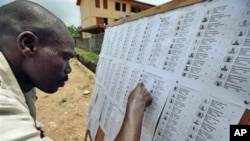In Nigeria, the Independent National Electoral Commission (INEC) says close to 70 million people have registered to vote in national elections this April. But critics are questioning the authenticity of the figures, saying INEC was not likely to have registered half of the country’s projected 140 million people in three weeks. They mention the problems with defective machines, long lines at registration centers and poorly trained staff.
But INEC says the figure is indeed an accurate reflection of the number of those who registered.
“We conducted the voter registration over a period of three weeks and an additional two days in some selected areas and the figure we gave is the provisional figure of those whose data we were able to capture in our data bank. It was not a concocted figure or anything,” said Kayode Idowu, press secretary to the INEC chairman.
Some analysts say the number was high because several top politicians influenced the process to give themselves more votes during the election.
Idowu dismissed the criticism.
“It’s a provisional figure," he said. "What that means is that after we have applied the software that would detect multiple registrations and eliminate such, and after we have taken the claims and objections… we will apply that to clean up the figures and then come up with the satisfied register by March 2nd.”
Idowu says the commission deployed its voter registration machines countrywide and protected the integrity of the results.
“People were asked to come out and register. Nobody prevented anyone from doing that.”
He defended the high number of voters registered in some parts of the country as consistent with their population.
“I don’t know the basis for the argument," he said. "Don’t forget that this country had a census in 2006. Granted there is no unanimity over those figures. The truth is that it… gives a demographic pattern all over the country. What we did was simply to project on the global standard.”




